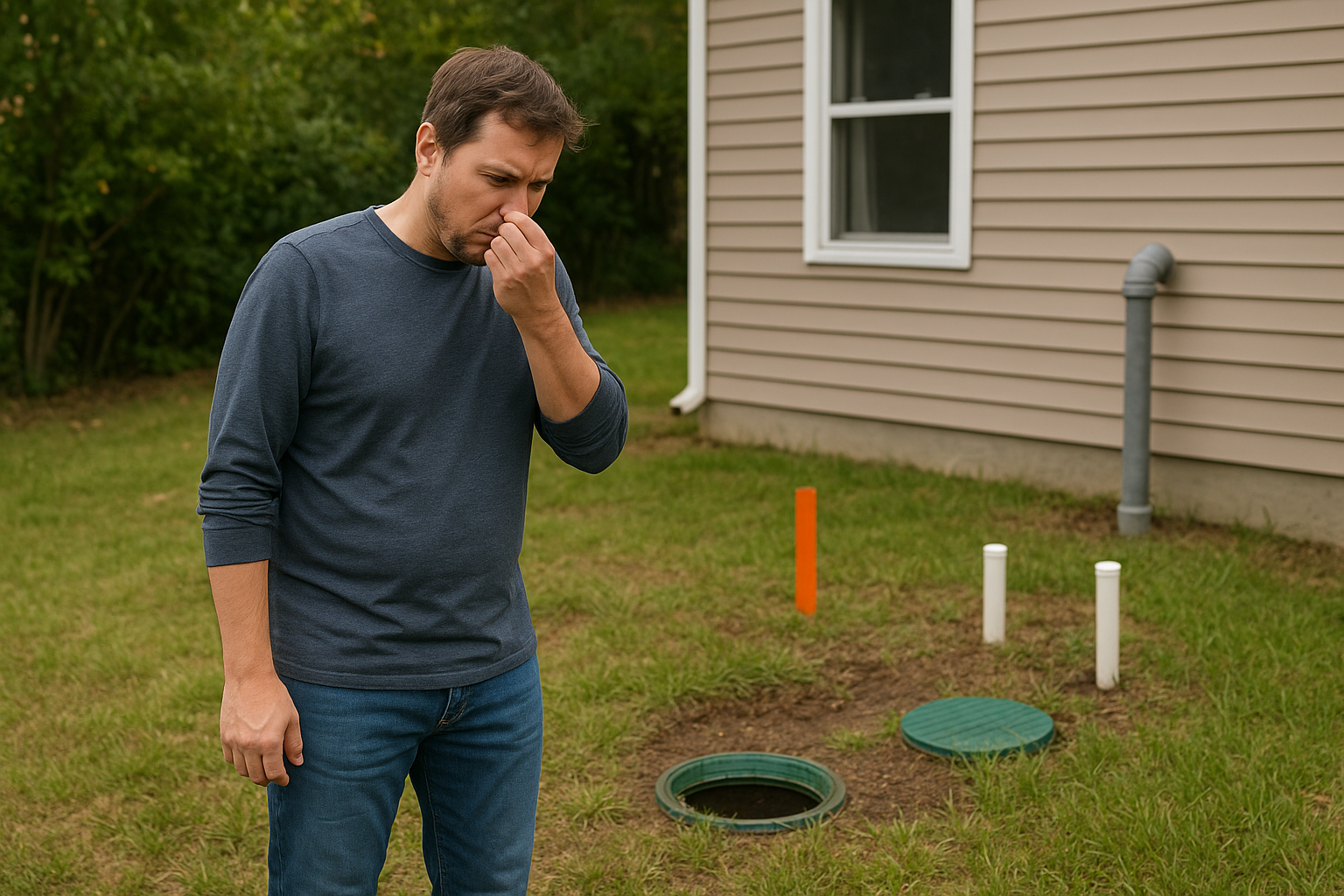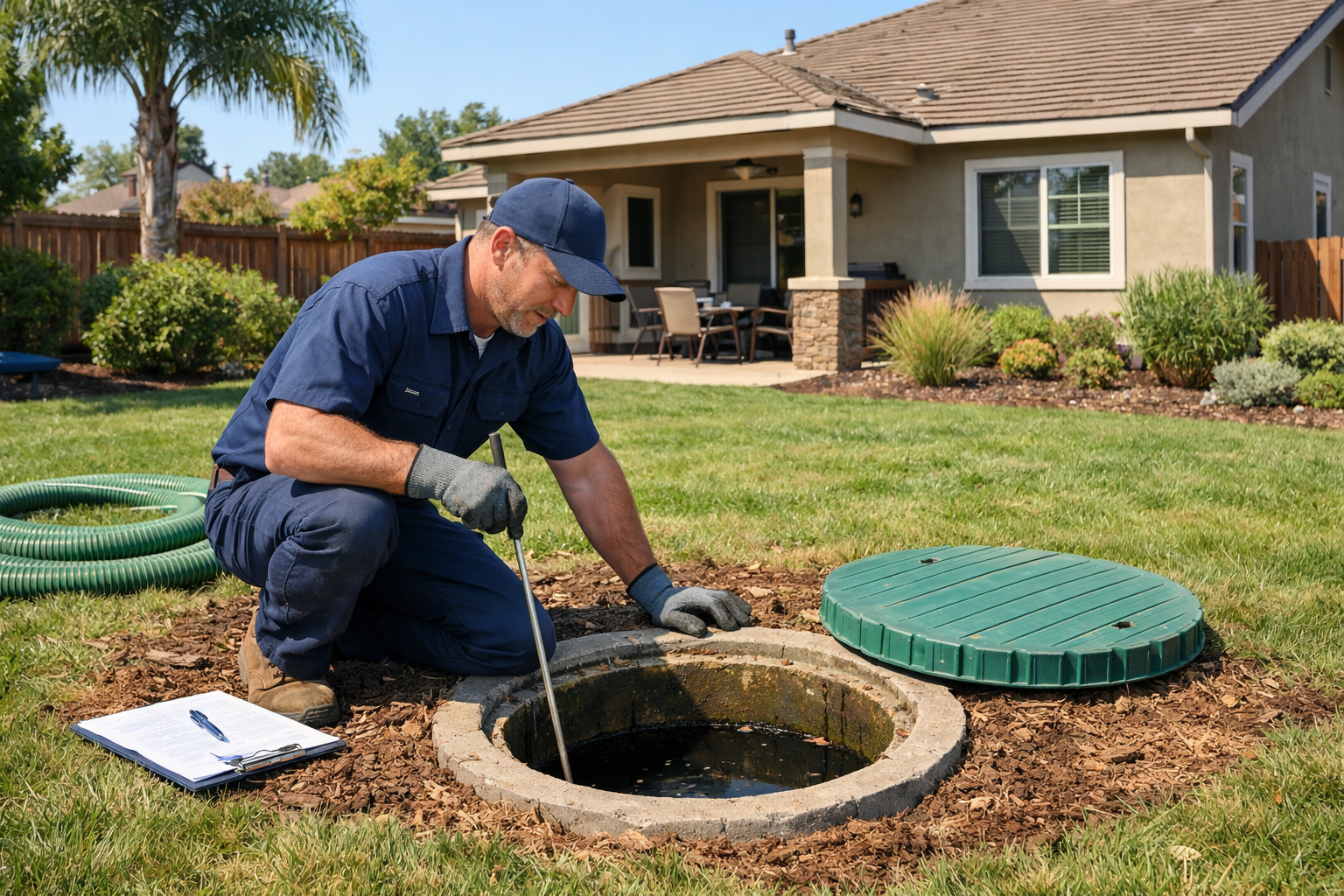Ever walked into your yard or basement and caught a whiff of something… off? That telltale sewer smell or sulfur odor in the home isn’t just unpleasant—it’s often a sign your septic system is trying to tell you something. And if you’ve been ignoring it, you’re definitely not alone.
Septic tank odors are more common than most people think, and they can sneak up on even the most diligent homeowners. But here’s the good news: these sewage odors are usually fixable—and more importantly, preventable—if you know what to look for.
In this guide, we’ll dive into the most likely causes behind septic tank smells, show you how to deal with them effectively, and offer practical tips for septic tank maintenance to keep your system running clean and odor-free.
Stick with us, and by the end of this post, you’ll have expert-backed insights, actionable solutions, and even some go-to smelly bathroom solutions to stop the stink for good.
A Quick Look at Septic Systems and Why Odors Happen
Septic systems have been around for over a century, providing an off-grid, cost-effective way to treat household waste in homes without access to municipal sewer line hookups. While the basic idea has stayed the same, modern systems now use improved materials, better ventilation, and more reliable leach field maintenance—but they’re still prone to septic tank backup and sewer odor issues.
At its core, a septic system consists of a tank that holds and breaks down human waste, and a drain field where filtered water seeps safely into the soil. This process depends on helpful bacteria. But when something like septic vent pipe issues, a dry p trap, or blocked vent disrupts the balance, hydrogen sulfide gas and other odors can quickly take over.
Today, homeowners face more odor issues due to neglect, overuse, and the use of toxic cleaners, chemical drain openers, and even latex paint waste. All these elements can interfere with how your plumbing system and septic tank health function.
Understanding how your septic system works—and how things like pouring toxins, baby wipes, cooking oil, and household chemicals damage pipes—is key to prevention.
Top Reasons Your Septic System Smells (and What They Mean)
When your septic system gives off an odor, it’s usually a sign something’s gone wrong. Here’s what could be causing it:
- Blocked or Broken Vent Pipe – These pipes let sewer gas escape. If they’re blocked by debris or roof drains, gases seep into your home or yard.
- Full or Overloaded Tank – If you haven’t had the tank pumped, septic tank backup becomes likely, forcing gases up through drains.
- Dry Drain Traps – Sinks or drains that aren’t used often can dry out, allowing sewage smell to enter.
- Leaking Seals or Gaskets – Around toilets or caps, this lets household plumbing odors into your space.
- Drain Field Problems – A failing or oversaturated drain field can’t process wastewater treatment smell, resulting in sewage surfacing.
These issues are often related. A full tank can cause grease trap smell and drainfield saturation, which then pushes odors up through the main sewer line.
Example: You skipped your last septic pumping service. Suddenly your backyard reeks, water drains slowly, and your utility sink starts bubbling. It’s likely your tank is full, the sludge layer is thick, and your drain field is overwhelmed.
Why Septic Smells Shouldn’t Be Ignored
Tempted to light a candle and forget it? Think again. Septic tank odors are red flags.
- Health Hazard – Gases like hydrogen sulfide are harmful.
- Costly Repairs – A missed septic inspection can lead to damage pipes and costly repairs.
- Lower Home Value – Lingering sewage odors can make resale tough.
- System Failure – Ignoring minor issues leads to full system failure.
- Environmental Impact – Leaks contaminate surface water and nearby ponds with coliform bacteria.
Real Story: A family ignored a sulfur odor in the home for months. A septic service professional later discovered septic vent pipe issues, water damage in the attic, and mold. It could’ve been avoided with regular septic system maintenance and early leak detection.
Common Challenges and How to Handle Them
Even well-maintained systems have hiccups. Here’s what makes septic tank odors tricky:
- Hidden Cracks – Hard to see, easy to miss.
- Old Equipment – Older systems lack safeguards.
- Skipped Pumping – Many forget the 3–5 year rule.
- Weather Swings – Can dry out traps or freeze sump pumps and vents.
Common Misconceptions:
- “If there’s no visible leak, we’re good.” Not true. Septic tank odors often come first.
- “Pour bleach down the kitchen sink.” Actually, that harms your biofilter for septic function.
What You Can Do:
- Get your system inspected regularly.
- Book a septic pumping service every 3–5 years.
- Avoid pouring oil based paints, cooking grease, or coffee grounds down the drain.
- Use septic tank additives only when advised.
- Keep your household plumbing wet and sealed.
Your Septic Odor Prevention Game Plan
Here’s what you can do now to avoid future septic tank odors:
Quick Fixes:
- Pump the Tank – If it's full, get it emptied.
- Inspect Vent Pipes – Ensure they’re not blocked or cracked.
- Seal All Leaks – From toilet paper buildup to loose gaskets.
- Protect the Drainfield – Don't plant trees, park heavy equipment, or overwater.
- Use Septic Safe Cleaners – Toss out bleach and chemical drain openers.
Best Practices:
- Log your septic tank maintenance dates
- Don’t pour cooking oil, paint, or other chemicals down your garbage disposal
- Avoid flushing feminine hygiene products, baby wipes, dental floss, and paper towels
- Stick to only full loads in your washing machine
- Use high efficiency toilets and faucet aerators to reduce water load
Helpful Tools:
- Drain snake over chemicals for a clogged drain
- Odor neutralizer products for temporary relief
- Water efficient products for smart consumption
- Septic service apps for scheduling regular maintenance
Start with one easy step: check your vent pipe today.
What the Future Holds for Septic System Management
Change is coming for septic system maintenance:
Trends to Watch:
- Smart Sensors – Real-time alerts for odor or overflow
- Eco-Friendly Tanks – Systems that reduce household waste
- Auto Reminders – For septic system cleaning and inspections
- Public Education – More local programs on properly dispose practices
Who Benefits:
- Rural homeowners off city sewers
- First-time buyers learning septic tank health
- Towns trying to minimize sewage smell
The future is proactive, automated, and less stinky.
Wrapping Up: Say Goodbye to Septic Smells
You’ve now got the essentials on tackling septic tank odors, fixing them, and keeping them gone.
Key Takeaways:
- Sewer odor often points to septic system imbalance.
- Regular septic service prevents backup and damage.
- Smart habits save money, time, and health.
Don't wait for solid material buildup or sewage surfacing to strike—take action now.
Book a septic inspection, check your drain lines, or talk to a septic professional today.
One Last Thought Before You Go…
Your septic system may be hidden underground, but it plays a huge role in protecting your home, health, and environment.
Here are a few ways to stay ahead:
- Stop pouring toxins down the drain
- Talk to a service provider about upgrades
- Learn about biofilter for septic technology
- Properly discard cat litter, cigarette butts, and paint
We’d love to hear from you—share what worked, what surprised you, or your own smelly bathroom solutions below.
Here’s to a fresh, stink-free future.






